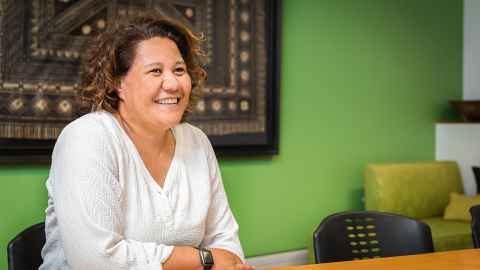'Remember, Covid-19 knows no ethnicity': Pacific mental health expert
19 August 2020
Dr Jemaima Tiatia-Seath says the family at the centre of the recent Auckland Covid-19 cluster is feeling well supported.

Despite the negativity of a rumour, the family at the centre of the recent Auckland Covid-19 cluster is being well supported by the community.
Dr Jemaima Tiatia-Seath, co-head of the School of Māori Studies and Pacific Studies at the University of Auckland, is a specialist in mental health and well-being among Pacific people.
She says although the inaccurate story about the South Auckland family, which went viral on social media but has been roundly debunked, affected them and the wider community, she has seen excellent wraparound support since.
“There was the naming and shaming, but I’ve also seen some really encouraging stuff to support that original family and help them through the ordeal.
“The mobilising amongst Pacific communities has been amazing. There’s lots of information being put out there in the different languages to ensure Pacific communities are on top of it.
“Social media is full of conspiracy theories that don’t help, but the Ministry of Health and the Ministry of Pacific Peoples have been excellent in terms of getting accurate and Pacific-specific information out there. We've also had respected Pacific health professionals who are very vocal online, that helps.”
It’s the virus not the family and we already know Covid-19 knows no ethnicity.
She says, however, that such occurrences reveal inequity in reporting and general public commentary.
“Pointing out the ethnicity of this family is annoying and unnecessary. It’s the virus, not the family and we already know Covid-19 knows no ethnicity. It’s not like we’re hearing ethnicity reported when we talk about all the people not following the restrictions in Auckland for Level 3.”
Dr Tiatia-Seath said in the last lockdown Auckland’s Pacific people and Māori were the least infected.
“To reveal the ethnicity this time around is quite stigmatising.”
She says the advice she would give to the Pacific community stressed by Level 3 lockdown in Auckland is the same as she’d give any member of the community.
“We’re all the same, we all feel anxious leaving the house and juggling family, work and schooling or job loss. It may sound like a cliché but sometimes we need a reminder that it’s extremely important to check in with each other.
“When we’re disconnected from people, it can be hard to pick up the signs of distress without being physically present.
“So it’s important to make sure we’re checking in on loved ones, friends, colleagues, students and also watching for digital fatigue.”
She says part of that is self-assessing and making sure we adopt some “positive vices”.
“We need to be vigilant about our own well-being as well as other people’s.”
Media contact
Julianne Evans | Media adviser, Faculty of Arts
Mob: 027 562 5868
Email: julianne.evans@auckland.ac.nz